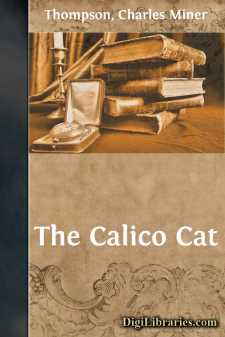Categories
- Antiques & Collectibles 13
- Architecture 36
- Art 48
- Bibles 22
- Biography & Autobiography 813
- Body, Mind & Spirit 141
- Business & Economics 28
- Children's Books 12
- Children's Fiction 9
- Computers 4
- Cooking 94
- Crafts & Hobbies 4
- Drama 346
- Education 46
- Family & Relationships 57
- Fiction 11826
- Games 19
- Gardening 17
- Health & Fitness 34
- History 1377
- House & Home 1
- Humor 147
- Juvenile Fiction 1873
- Juvenile Nonfiction 202
- Language Arts & Disciplines 88
- Law 16
- Literary Collections 686
- Literary Criticism 179
- Mathematics 13
- Medical 41
- Music 40
- Nature 179
- Non-Classifiable 1768
- Performing Arts 7
- Periodicals 1453
- Philosophy 64
- Photography 2
- Poetry 896
- Political Science 203
- Psychology 42
- Reference 154
- Religion 513
- Science 126
- Self-Help 83
- Social Science 81
- Sports & Recreation 34
- Study Aids 3
- Technology & Engineering 59
- Transportation 23
- Travel 463
- True Crime 29
The Calico Cat
Description:
Excerpt
THE CALICO CAT
I
Mr. peaslee looked more complacent than ever. It was Saturday noon, and Solomon had just returned from his usual morning sojourn "up-street." He had taken off his coat, and was washing his face at the sink, while his wife was "dishing up" the midday meal. There was salt codfish, soaked fresh, and stewed in milk—"picked up," as the phrase goes; there were baked potatoes and a thin, pale-looking pie. Mrs. Peaslee did not believe in pampering the flesh, and she did believe in saving every possible cent.
"Well," said Mr. Peaslee, as they sat down to this feast, "I guess I've got news for ye."
His wife gazed at him with interest.
"Are ye drawed?" she asked.
"Got the notice from Whitcomb right in my pocket. Grand juror. September term. 'T ain't more'n a week off."
The staccato utterance was caused by the big mouthfuls of codfish and potato which, between phrases, Mr. Peaslee conveyed to his mouth. It was plain to see that he was greatly pleased with his new dignity.
"What do they give ye for it?" asked his wife. Solomon should accept no office which did not bring profit.
"Two dollars a day and mileage," said Mr. Peaslee, with the emphasis of one who knows he will make a sensation.
"Mileage? What's that?"
"Travelin' expenses. State allows ye so much a mile. I get eight cents for goin' to the courthouse."
"Ye get eight cents every day?" asked his wife, her eyes snapping. She was vague about the duties of a grand juror; maybe he had to earn his two dollars; but she had exact ideas about the trouble of walking "up-street." To get eight cents for that was being paid for doing nothing at all, and she was much astonished at the idea.
"Likely now, ain't it?" said Mr. Peaslee, with masculine scorn. "State don't waste money that way! Mileage's to get ye there an' take ye home again when term's over. You're s'posed to stay round 'tween whiles."
"Humph!" said his wife, disappointed. "They give ye two dollars a day"—she hazarded the shot—"just for settin' round and talkin', don't they? Walkin's considerable more of an effort for most folks."
"'Settin' round an' talkin'!'" exclaimed Mr. Peaslee, so indignantly that he stopped eating for a moment, knife and fork upright in his rigid, scandalized hands, while he gazed at his thin, energetic, shrewish little wife. "'Settin' round and talkin'!' It's mighty important work, now I tell ye. I guess there wouldn't be much law and order if it wa'n't for the grand jury. They don't take none but men o' jedgment. Takes gumption, I tell ye. Ye have to pay money to get that kind."
"Well," said his wife, with the air of one who concedes an unimportant point, "anyhow, it's good pay for a man whose time ain't worth anythin'."
"Ain't worth anythin'!" exclaimed Mr. Peaslee, in hurt tones. "Now, Sarepty, ye know better'n that. I don't know how they'll get along without me up to the bank. They've got a pretty good idee o' my jedgment 'bout mortgages. They don't pass any without my say so."
Mrs. Peaslee sniffed. "I've seen ye in the bank window, settin' round with Jim Bartlett and Si Spooner and the rest of 'em....


